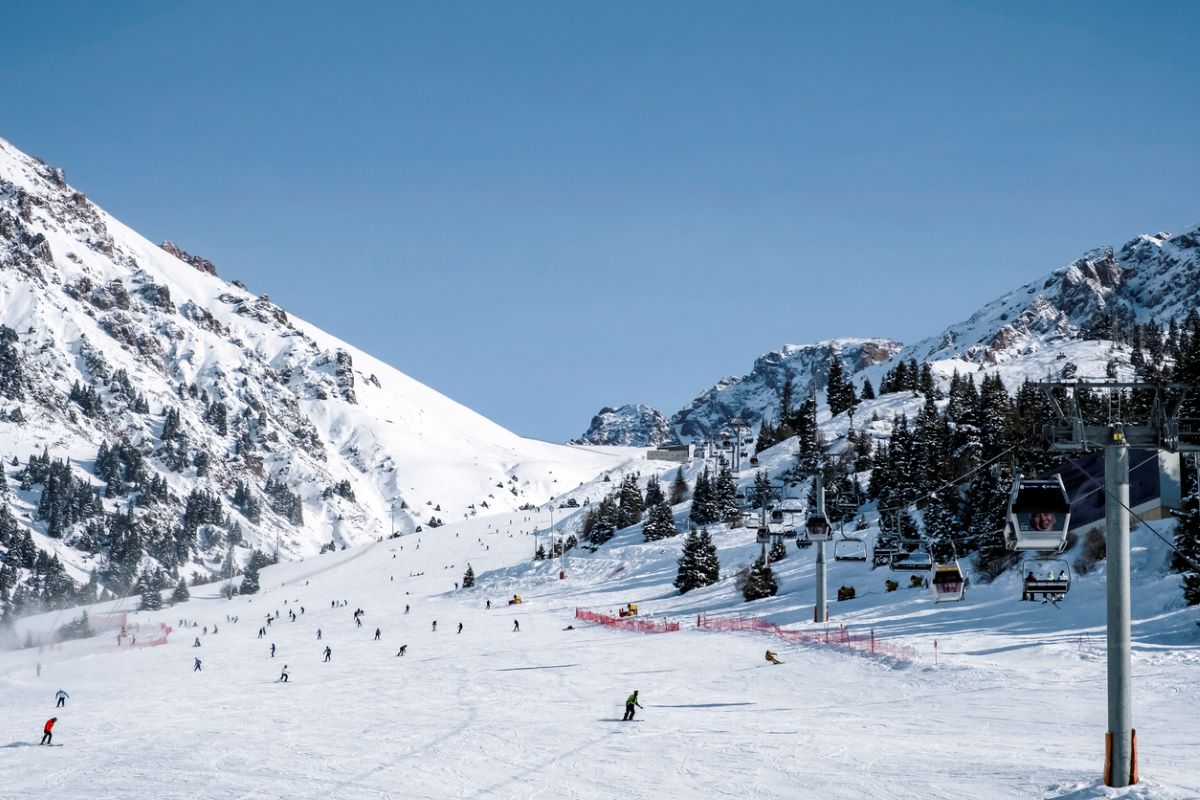Conscription law
In the crucible of conflict, Ukraine finds itself at a critical juncture, grappling with the harsh reality of war's relentless toll.
Perhaps uncertain of his prospects in challenging three decades of pelf and patronage, Tokayev appealed to Moscow for help, suggesting he couldn’t completely trust the Kazakh security forces. Vladimir Putin unhesitatingly stepped into the power play, dispatching 2,500 troops. That has unsettled the west, which is already embroiled in a tussle with the Russian president over Ukraine, with talks underway in Geneva.

representational image /Almaty, Kazakhstan (iStock photo)
The unrest that last week gripped the vast but sparsely populated Central Asian republic of Kazakhstan has spawned a great deal of lurid speculation, not least in the context of its geopolitical implications amid mounting tensions over Ukraine.
What connects the two is, of course, their mutual Soviet past. Ukraine played a key role in the dissolution of the USSR 30 years ago last month, and territorially the second-largest independent state to emerge from that phenomenon was Kazakhstan. In terms of its post-Soviet political trajectory, it followed the widespread norm whereby previous local Communist Party chiefs morphed almost overnight into potentates with a very different ideological bias.
Nursultan Nazarbayev was seen as a potential vice-president of the USSR until the latter imploded. He stayed in place until a couple of years ago as the chief honcho of his extensive fiefdom, cultivating a personality cult and regularly ‘winning’ elections with 95 plus per cent of the popular vote. The unconvincing veneer of Marxist-Leninist ideology gave way to an enthusiastic embrace of neoliberal capitalism. Kazakhstan’s substantial natural resources were thrown open to exploitation by the likes of Chevron and ExxonMobil. It wasn’t just the profits of the multinational enterprises, tho-ugh, that went westwards. So did the investments of the emerging Kazakh kleptocracy.
Advertisement
The Nazarbayev family and its cronies are heavily invested in luxury properties, and that is seen as just the tip of the iceberg. Not surprisingly, only 162 individuals are estimated to control almost half of Kazakhstan’s wealth. And that, in turn, makes it easier to understand why spontaneous protests erupted in the oil town of Zhanaozen at the turn of the year when the price of liquefied natural gas (LNG) doubled overnight. In the relatively impoverished west of the country, where Zhanaozen is located, LNG serves as the main fuel for vehicles. From there the unrest gathered momentum and the fuel price trigger evolved into broader demands for reform, but the protests remai-ned peaceful until they reached Almaty, the former capital, more than 1,600 kilometres from Zhanaozen.
The demonstrations there appear to have been invaded by criminal elements, and a spate of burning and looting followed, turning the city centre into what has been described as a post-apocalyptic landscape. By the time Nazarbayev’s handpicked successor, Kassym-Jomart Tokayev, rescinded the price rise and offered to consider other demands, it was a bit late. Tokayev combined his concessions with shoot-without warning orders and dark whispers about a foreign-inspired conspiracy, amid indications that the ruling elite was engaged in a power struggle that pitted the incumbent against Nazarbayev and his allies.
This sense was exacerbated by the arrest of former prime minister Karim Massimov based on allegations of treason, and the dismissal of several other Nazarbayev associates and relatives from prominent posts. Even the former president himself has been sidelined from his role as head of the national security council — and, despite his official designation as ‘leader of the nation’, Nazarbayev’s whereabouts are unknown, and he is yet to make any public statement about the present situation.
Perhaps uncertain of his prospects in challenging three decades of pelf and patronage, Tokayev appealed to Moscow for help, suggesting he couldn’t completely trust the Kazakh security forces. Vladimir Putin unhesitatingly stepped into the power play, dispatching 2,500 troops. That has unsettled the west, which is already embroiled in a tussle with the Russian president over Ukraine, with talks underway in Geneva.
The US and its allies have no qualms about expanding or consolidating their own spheres of influence but begin pushing panic buttons at the first hint of similar outreach — or overreach — by Moscow or Beijing. The west has badly mishandled the Ukraine situation by pushing Putin into a corner. One can’t be certain, but chances are the intention was to intimidate rather than invade the neighbouring state.
In the face of a steady barrage of US threats, however, any indication of backing off will be seen as a sign of weakness. That’s precisely what Putin is most allergic to, both personally and on behalf of Russia. Under Nazarbayev, Kazakhstan was on cordial terms with Moscow but almost equally friendly with Beijing and Washington. That balance is now likely to shift. More worrying than the geopolitical implications, though is the official death toll of 164 (quite likely an underestimate) and thousands of arrests.
Besides, notwithstanding his initial concessions to the protesters, Tokayev has offered no hint of favouring any structural changes that might remedy Kazakhstan’s disparities of wealth or its democratic deficit. Order might be restored in the short term, but instability is likely to endure.
(Dawn/ANN)
Advertisement